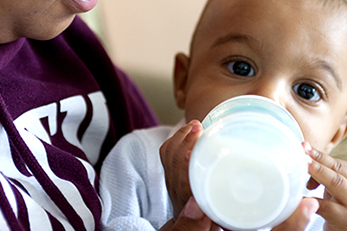A special time between you and your baby
When you breast feed, you have a relationship with your baby that no one else can have. Also, breast milk protects your baby's health.
Breastfed babies have:- Fewer ear infections
- Less diarrhea and less constipation
- Fewer illnesses like colds and the flu
- Allergies
- Asthma
- Some childhood cancers
- Diabetes
Other Benefits
Breastfeeding Saves Money
Formula is expensive. If you decide not to breastfeed, Women’s Infants & Children (WIC) supplies some of the formula your baby will need. You will also spend money on bottles, nipples and other equipment.
Breastfeeding Helps the Environment
Breastfeeding is natural and good for the environment. There is no waste. Your formula cans and old bottles will add to our landfills.
Why is breastfeeding the best choice?
- Your breast milk is always available when your baby wants it. Anywhere. Anytime.
- You can be sure your breast milk is pure, clean and safe.
- Your breast milk changes to meet the needs of your growing baby. Formula stays the same.
- Babies need different amounts of food. Breastfed babies get just the right amount.
- You will not need to wash bottles or heat formula. Your milk is naturally clean and warm.
- Breastfed babies are less likely to spit up than formula-fed babies. When they do, it does not stain like formula.
- Your uterus will return to its normal size faster when you breastfeed.
- Breastfeeding reduces the risk of some types of ovarian and breast cancer.
- Sitting down to breastfeed will help you rest and regain your strength after the pregnancy.
- Breastfeeding hormones will help you relax and feel close to your baby.
- Breastfed babies smell sweeter and their diapers do not have an unpleasant odor. Remember… your baby will need breast milk or formula for the first year.
Not sure your baby is eating enough?
- Count your baby's wet diapers. Six to eight wet diapers a day, probably means your baby is getting enough milk.
- Ask your baby's provider or a lactation consultant for help with breastfeeding.
- Find a breastfeeding support group.



